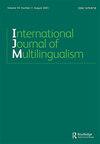The mosaic of language and identity: territorial identification, linguistic attitudes, and proficiency in young immigrants of Catalonia
IF 2
1区 文学
Q2 EDUCATION & EDUCATIONAL RESEARCH
引用次数: 0
Abstract
ABSTRACTThis study investigates the relationship between identification with the local territory, language attitudes and language proficiency in young immigrants in Catalonia, a region in Spain. The aims of the study are to examine how identification with the local territory affects attitudes and proficiency in languages, and whether language attitudes have a mediating effect on these relationships. The study used a sample of 543 students from the three main immigrant groups in Catalonia. Multigroup path analysis was performed. The results showed that identification with the local territory favoured attitudes to, and proficiency in, the language associated with that territory while disadvantaging the other language. However, the effect that identification with the local territory had on the level of language proficiency depended on the mediating effect of language attitudes. These findings help to explain why young immigrants’ acquisition of language proficiency varies, and they highlight the facilitating or attenuating roles in the process of language acquisition of identification with the local territory and language attitudes.KEYWORDS: Identification with the local territorylanguage attitudeslanguage proficiencysecond language acquisitionpath analysis Disclosure statementNo potential conflict of interest was reported by the author(s).Additional informationFundingThis work was supported by the Spanish Ministry of Economy and Competitiveness under Grants EDU2017-82479-R & IJCI-2016-28250; and Agency for Management of University and Research Grants – AGAUR of the Government of Catalonia under Grants 2017 SGR 322 and 2020 FI SDUR 00172.语言和身份的镶嵌:加泰罗尼亚年轻移民的领土认同、语言态度和熟练程度
摘要本研究探讨西班牙加泰罗尼亚地区青年移民的地域认同、语言态度和语言能力之间的关系。本研究的目的是研究对当地领土的认同如何影响语言态度和语言熟练程度,以及语言态度是否对这些关系有中介作用。这项研究使用了来自加泰罗尼亚三个主要移民群体的543名学生的样本。进行多组路径分析。结果表明,对当地领土的认同有利于对与该领土有关的语言的态度和熟练程度,而不利于其他语言。然而,地域认同对语言熟练程度的影响取决于语言态度的中介作用。这些发现有助于解释为什么年轻移民的语言能力习得存在差异,并强调了对当地领土的认同和语言态度在语言习得过程中的促进或减弱作用。关键词:地域认同、语言态度、语言熟练程度、第二语言习得路径分析披露声明作者未报告潜在利益冲突。本研究由西班牙经济和竞争力部资助,资助项目为EDU2017-82479-R & IJCI-2016-28250;以及加泰罗尼亚政府大学和研究资助管理机构(AGAUR),资助金额为2017 SGR 322和2020 FI SDUR 00172。
本文章由计算机程序翻译,如有差异,请以英文原文为准。
求助全文
约1分钟内获得全文
求助全文
来源期刊

International Journal of Multilingualism
Multiple-
CiteScore
6.10
自引率
8.70%
发文量
67
期刊介绍:
The aim of the International Journal of Multilingualism (IJM) is to foster, present and spread research focused on psycholinguistic, sociolinguistic and educational aspects of multilingual acquisition and multilingualism. The journal is interdisciplinary and seeks to go beyond bilingualism and second language acquisition by developing the understanding of the specific characteristics of acquiring, processing and using more than two languages. The International Journal of Multilingualism (IJM) provides a forum wherein academics, researchers and practitioners may read and publish high-quality, original and state-of-the-art papers describing theoretical and empirical aspects that can contribute to advance our understanding of multilingualism.Topics of interest to IJM include, but are not limited to the following: early trilingualism, multilingual competence, foreign language learning within bilingual education, multilingual literacy, multilingual identity, metalinguistic awareness in multilinguals, multilingual representations in the mind or language use in multilingual communities. The editors encourage the submission of high quality papers on these areas as well as on other topics relevant to the interest of the International Journal Multilingualism (IJM). Reviews of important, up-to-date, relevant publications and proposals for special issues on relevant topics are also welcome.
 求助内容:
求助内容: 应助结果提醒方式:
应助结果提醒方式:


